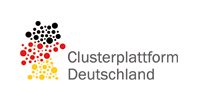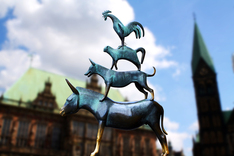Free Hanseatic City of Bremen
The Keys to Innovation 2030 - Strategy for Innovation, Services and Industry in the State of Bremen (in short: Innovation Strategy for the State of Bremen 2030) represents Bremen's updated regional innovation strategy for intelligent specialization (RIS3). Five key innovation fields are defined, to which the state of Bremen aligns its innovation and cluster policy:
In the key innovation field Sustainable Management and Resource Efficiency, the potentials for the production of green hydrogen from wind energy and its use in different industries are particularly elaborated. The state of Bremen can distinguish itself with test fields for applications of hydrogen technologies on water, on land and in the air and as a center for the transformation of industrial structures. ECOMAT is a central research and technology center for eco-efficient materials.
The key innovation field Connected and Adaptive Industry shows how the manufacturing sector is supported in transformation processes by promoting important key technologies such as measurement and control technology, lightweight construction and additive manufacturing as well as autonomous systems and robotics at the location.
The key innovation field Mobility of the Future emphasizes Bremen's special location, through which mobility on land, water and in the air is researched, developed and translated into concrete applications. Technological issues such as new means of transport, autonomous/automated mobility, alternative forms of propulsion and the control of transport and logistics processes are the focus here.
The key innovation field Intelligent Services is intended to strengthen Bremen as a service location in the future, especially for the food and beverage and healthcare industries.
In the key innovation field "Digital Transformation", the state of Bremen aims to establish itself as a leading location for artificial intelligence (AI) in Germany.
The promotion of clusters is a central element of innovation policy in the state of Bremen. The clusters inform and advise their members about suitable funding and financing opportunities and help find potential cooperation partners. They play an important role in the supraregional and international networking of the business location. Established cluster and network structures exist especially in the key industries of the state of Bremen: AVIASPACE Bremen e.V. focuses on lightweight construction, robotics and green flying in the aerospace sector and maintains an ESA BIC. In the Maritime Cluster Northern Germany (MCN e.V.), Bremen focuses on new forms of propulsion in shipping as well as maritime technologies. WAB e.V. The network for wind energy is making its mark with new topics such as hydrogen from wind power. Automotive Nordwest e.V. is established in the Bremen-Oldenburg metropolitan region in the northwest. The food and luxury food industry, represented by NaGeB e.V., will in future promote start-ups in particular through a food hub.
Project-related technology funding is primarily provided through Bremen's funding guidelines for research, development and innovation (FEI), the Programme for the Promotion of Applied Environmental Technologies (PFAU), the Applied Environmental Research Programme (AUF), and the Aerospace Research Programme (LuRaFo). With the START Haus initiative, Bremen has had a central point of contact for all those interested in starting a business under the umbrella of Bremer Aufbau-Bank GmbH (BAB) since 2017. This acts as a one-stop agency especially for start-ups.
Lighthouses:
With ECOMAT, a unique research and technology center has been created in the airport city of Bremen. It bundles the existing competencies of industry and science in the field of lightweight construction. ECOMAT stands for Center for Eco-efficient Materials & Technologies and houses around 500 employees from science and industrial partners.
Bremerhaven is becoming the home port for the Green Economy. It networks the potentials of the wind energy industry, the Greenports Initiative, the Kurs Klimastadt (Course Climate City) network, and others, and in the future, with a sustainable business park on the Luneplate, will offer optimal conditions for companies that want to do business ecologically and sustainably.
(last update: March 2022)
More information
- Recommend this page:
- Print view

